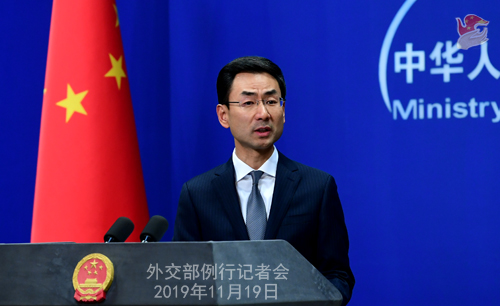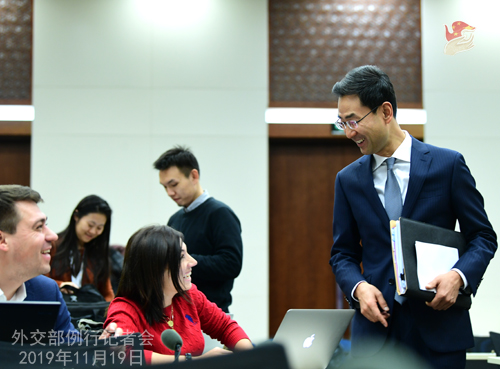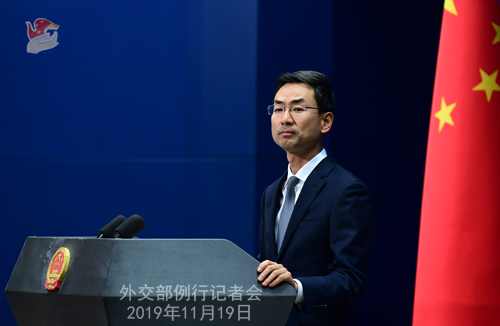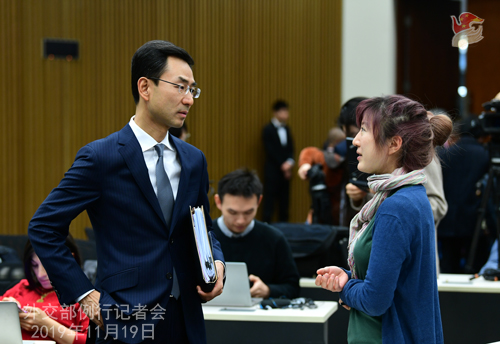| Foreign Ministry Spokesperson Geng Shuang's Regular Press Conference on November 19, 2019 |
| 2019-11-19 19:07 |
|
Q: US Secretary of State Pompeo said at a press briefing on November 18 that the United States is gravely concerned by the deepening political unrest and violence in Hong Kong. The Hong Kong government bears primary responsibility, and violence by any side is unacceptable. China must honour its promises of freedoms and liberties to the Hong Kong people as enshrined in the Sino-British Joint Declaration. What's your comment? A: The sabotage and crimes of the violent offenders in Hong Kong have been escalating in recent days, which endanger the safety and destroy property of the citizens, trample on the rule of law and social order, undermine the city's stability and prosperity and challenge the bottom line of "one country, two systems". All this has hurled Hong Kong into a precarious situation. The most pressing task at the moment is ending violence and restoring order. The central government firmly supports the Hong Kong SAR government led by the Chief Executive in governing Hong Kong in accordance with law, the Hong Kong police in strictly enforcing law, and the Hong Kong judiciary in bringing criminals to justice according to law. Hong Kong affairs are purely China's internal affairs. No foreign government, organization or individual has the right to interfere. The US recent remarks on Hong Kong, though dressed up as impartial observations, are in fact a manifestation of their hidden agenda and double standards on violent crimes. It is in itself a travesty of rule of law and human rights to mention the law enforcement to end violence by the police in the same breath as the extreme violent crimes of the radicals. The US mentioned China's "promises" in the Sino-British Joint Declaration. I want to state clearly that with Hong Kong's return to China in 1997, the UK's rights and obligations stipulated in the Sino-British Joint Declaration were all completed. The US has no legal ground, nor is it in a position to invoke the joint declaration to meddle in Hong Kong affairs. We urge the US to respect China's sovereignty, stop making irresponsible remarks, stop condoning violent crimes in a disguised manner, stop meddling in China's internal affairs. I want to stress that the Chinese government is determined to safeguard national sovereignty, security and development interests, implement the "one country, two systems" policy, and oppose any foreign interference in Hong Kong affairs.
Q: US Secretary of State Pompeo said on November 18 that the establishment of Israeli civilian settlements is not inconsistent with international law, and that calling the establishment of civilian settlements inconsistent with international law hasn't advanced the cause of peace. The US is not prejudging the ultimate status of the West Bank or undermining the prospect of a "two-state solution". This is not a green light for building more settlements. Israel welcomed and appreciated those remarks from the US side, while the Palestinian president's office and the European Union rejected them in their statements. I wonder if you could tell us China's position? A: The issue of settlements is a major one in negotiations between Palestine and Israel regarding the ultimate status. According to UN Security Council Resolution 2334, it is against international law to establish settlements in the occupied territory of Palestine, including East Jerusalem. In light of the severe situation between Palestine and Israel, China calls on the US to shoulder its responsibilities, play a constructive role and avoid escalating confrontation or adding new complexity to this issue. Q: US Defense Secretary Esper said during a meeting with his ASEAN counterparts on November 17 that China's activities in the South China Sea pose a threat to other countries, and that ASEAN cannot allow China to manipulate the COC. The US military conducted the most frequent "freedom of navigation" operations in the South China Sea this year in 25 years, which is of special significance in the context of China's militarization activities here. I wonder if you have a comment on his remarks? A: For quite some time the US has been trying to disrupt peace and stability in the South China Sea by stirring up trouble and creating splits. Countries in the region have been soberly aware of that. With the joint efforts by China and ASEAN countries, situation in the South China Sea is generally stable and there is no problem at all with freedom of navigation. At the recently-concluded 22nd China-ASEAN Summit, parties were pleased with and inspired by the progress made in COC negotiations. China stands ready to work with ASEAN countries to overcome disturbances and advance the scheduled consultations based on equal-footed consensus. China and ASEAN countries have the confidence, wisdom and capability to make the South China Sea a sea of peace, friendship and cooperation, and maintain lasting peace and stability in this region. That said, as the Chinese proverb goes, "The tree desires calmness but the wind will not cease". Under the pretext of "freedom of navigation", the US frequently sent military vessels and aircraft to this region for provocation in other countries' territorial waters or joint exercises to flex its military muscles. The US willful trespassing is the cause of tensions in the South China Sea, and its attempt to sow discords is the threat to regional peace and stability. We urge the US to grasp the positive momentum in the region, respect and support regional countries' effort for stability, and stop making unconstructive, irresponsible and unpopular moves that undermine peace and stability in the South China Sea.
Q: Yesterday a Hong Kong court ruled that the mask ban was not compatible with the constitutional order laid down by the Basic Law. Given the statement of the spokesperson of the Legislative Affairs Commission of the NPC Standing Committee this morning, does China have any further plans to issue an interpretation of the Basic Law? And if so, will this conflict with the "one country, two systems" principle? A: I believe you understand that this is not a diplomatic matter. Statements on the ruling of this case were made by spokespersons of the Legislative Affairs Commission of the NPC Standing Committee and the Hong Kong and Macao Affairs Office of the State Council. They have made clear the central government's position on this matter. Q: The US on Monday offered another 90-day license period for Huawei to continue doing business with their US counterparts. So is the Chinese government doing anything to get any favorable conditions for Huawei? Is this a major discussion point in the trade deal or even a precondition for signing a phase one deal? A: Regarding the extension of the temporary general license, Huawei already gave a response. We also made clear our stance on many occasions previously. We urge the US to stop abusing the national security concept and export control measures to discriminate against targeted enterprises of other countries and stop politicizing economic and trade issues. You also asked whether the Chinese government did anything to get any favorable conditions for Huawei or other Chinese companies. I can tell you clearly that we do not seek special treatment for Chinese businesses, but only equal treatment for them, Huawei included. As to the China-US trade talks, not long ago, the heads of the two teams had a telephone conversation. As I understand, the two sides stay in close contact.
|
 |
|



